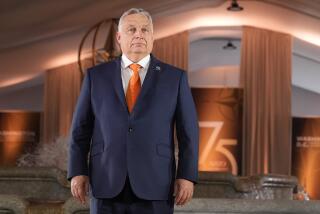Spaniards Roll Out the Unwelcome Mat for Bush
- Share via
MADRID — For all the fanfare surrounding President Bush’s inaugural official visit to Europe, he was largely out of sight here Tuesday on the first stop on his five-nation tour.
It was probably just as well. Public reaction generally ranged from tepid to scathing. El Pais, the largest Spanish daily newspaper, welcomed the president by labeling his visit “tedious” and describing him as “not a very pleasant man--and there are demonstrations to let him know.”
For the third day, protesters from several groups demonstrated outside the U.S. Embassy to challenge an array of Bush administration policies, from the death penalty to sanctions on Iraq. As his bulletproof limousine with darkened windows drove onto the embassy grounds, which were surrounded by more than 100 riot police, about 500 protesters chanted, “Assassin, assassin, assassin!” from across the street.
One of dozens of anti-Bush banners declared: “Bush is an imbecile. The world is not his ranch.” Another group wore stickers proclaiming, “Bush=Taliban.”
“Just as the Taliban is ruining all that was good in Afghanistan--its culture, its politics, its symbols--so too is Bush doing the same in the United States,” said Paco Mendez, a 52-year-old sanitation worker for Spain’s Health Ministry, who demonstrated outside the embassy. “The danger is that he’s also now trying to do it in the rest of the world too.”
Bush’s reception was in stark contrast to the friendly mobs that greeted his predecessor in such nations as Vietnam and Ireland. Unlike former President Clinton’s crowd-pleasing outings, Bush limited his contact to Spain’s prime minister and royal family. There was no mingling--either programmed or impromptu--with the people, no speech in parliament, no meeting with civil groups, not even a cultural excursion.
Monday’s execution of U.S. terrorist Timothy J. McVeigh almost overshadowed the president’s visit, a reflection of overwhelming European opposition to capital punishment. No country can join the European Union unless it outlaws the death penalty.
The night before Bush’s arrival, demonstrators outside the U.S. Embassy carried candles and banners declaring him a “compassionate killer.” La Vanguardia, Barcelona’s major paper, admonished, “No one--not even the state--has the right to take a life.”
Public reaction was angrier.
Bush “leads a country that is supposed to defend human rights, but as governor of Texas he was a man who approved of executions. His hands are stained with blood,” said David Bonel, a 33-year-old airline steward who was shopping at a toy store near the embassy. “So who’s George Bush to tell us what’s right and wrong?”
“The purpose of this trip has not been welcome in Europe,” explained Fernando Rodrigo, professor of international relations at the Autonomous University of Madrid. “Not one of Bush’s initiatives--on missile defense, on the environment and other issues--has been welcome.”
Tuesday was an ominous beginning for a tour in which more than public opinion is at stake. Bush’s first official trip to Europe--and his reception in five disparate countries--will set the benchmark for his administration’s relations with the world. If America’s closest allies basically spurn him or his key initiatives, such as strategic missile defense, Bush is likely to find it difficult to restore his image here any time soon.
It will almost certainly make the task of selling his already controversial policies even tougher at the two biggest summits Bush will attend this year. Next month he is to meet with the heads of the world’s eight major industrialized nations in Genoa, Italy; in October, he will journey to China, the world’s largest emerging power.
In a possible sign of things to come, other parts of Europe also offered little in the way of a welcome. “George Bush is the strangest American president most Europeans have ever seen. . . . Does Dubya have what it takes?” wrote Hugo Young in the Guardian, a British newspaper.
In a gaffe that many Spaniards took as a symbol of the president’s performance on foreign policy, Bush made a slip in pronouncing the name of Prime Minster Jose Maria Aznar during an interview Monday with European reporters in Washington. He transposed letters and referred to the Spanish leader as “Anzar.”
In what appeared to be a bit of personal diplomacy on the part of the Spanish leader, Aznar complimented Bush at their news conference here by commenting on the president’s ability to speak Spanish “better and better every day.”
But the European media was remorseless in predicting that the Aznar-Anzar faux pas wouldn’t be Bush’s only goof.
“The slightest garbling of syntax, the merest confusion of Slovenia [where Bush will meet Russian President Vladimir V. Putin on Saturday] with Slovakia, will confirm every fashionable prejudice on the European center-left that the 43rd president is a bloodthirsty, ignorant Texas oilman, in way over his head,” editorialized the Independent in London.
For all the criticism in Spain, Bush had few alternatives but to begin his tour in Madrid, with its conservative leadership. Europe is led largely by center-left governments backed by popular sentiment that carry the danger of being even less receptive.
Even Spaniards, however, were skeptical about why he picked Spain. The newspaper ABC said the choice revealed the importance of Latin America and the growing influence of U.S. Hispanics.
But Rosa Montero, a syndicated columnist, said: “The fact that Bush starts his European trip in Spain could be another argument in favor of his very rumored foolishness, given that our country is one of the most anti-American in the world.”
More to Read
Sign up for Essential California
The most important California stories and recommendations in your inbox every morning.
You may occasionally receive promotional content from the Los Angeles Times.













